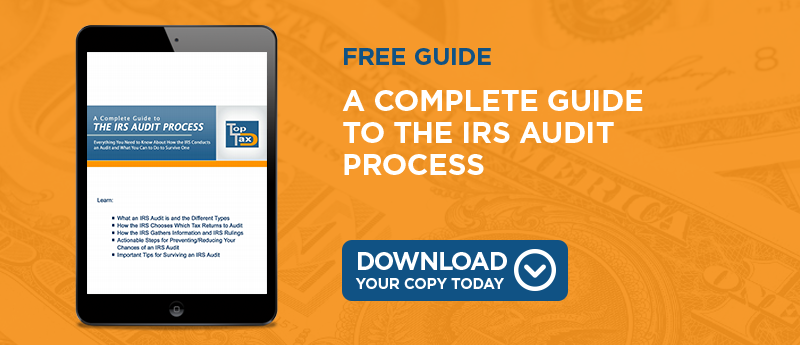
he IRS only audits about one percent of all submitted returns each year. Why do some returns raise audit red flags while the vast majority skates by without a hitch? There are specific items that may trigger a deeper tax review on certain returns. To avoid being subjected to an audit, here are the dirty dozen IRS audit red flags you'll want to watch out for.
1. Reporting a High Income Amount
Those who earn more than $200,000 a year face a 1 in 25 chance of being reviewed. Taxpayers who make $1,000,000 each year have a 1 in 8 chance of being audited.
2. Omitting to Report Taxable Income
Since the IRS receives copies of all wage and earnings statements such as Form W-2 or Form 1099, taxpayers who don't report all of their taxable income are likely to be audited.
3. Claiming Excessive Contributions to Charity
Reporting charitable contributions can raise an audit red flag if you don't have the documentation to back up your claim. This is especially true if you claim a large amount of noncash contributions that can't be substantiated.
4. Deducting Expenses for a Home Office
According to IRS tax laws, a home office must be used regularly and exclusively for business. Since many taxpayers who work at home often use these spaces for both business and pleasure, those who claim these expenses are likely to be audited.
5. Deducting Rental Real Estate Losses
If you rent real estate property for income and you take a loss for the year, you can claim up to $25,000 of the loss against your taxable income from other sources. However, the loss provision begins to be phased out for taxpayers who earn at least $100,000 annually.
6. Claiming a Deduction for Business Travel
The IRS takes a hard stance on business travel deductions. If a taxpayer reports expenses for travel, meals or entertainment for business the agency may well ask for written documentation proving these costs were not related to pleasure.
7. Deducting Vehicle Business Expenses
Claiming that a vehicle is used entirely for business purposes may cause a return to be audited. Very few taxpayers only use their automobiles for business reasons and the IRS might require proof of these expenses.
8. Claiming Hobby Losses
Hobbies that tend to cause losses such as breeding horses or racing cars are likely to be flagged by the IRS. If you report a loss from a hobby you can only deduct the losses up to the amount of income you also received from it.
9. Operating a Cash-Heavy Business
If you have a business that deals in a lot of cash like a restaurant, a bar or a hair salon you're more likely to be audited. Revenue agents may investigate if you're accurately reporting your income from cash.
10. Omitting a Foreign Bank Account on Your Return
Offshore accounts are a huge red flag for the IRS. If you have a bank account that is based in a foreign country be sure to report all of the income from it.
Those who earn more than $200,000 a year face a 1 in 25 chance of being reviewed. Taxpayers who make $1,000,000 each year have a 1 in 8 chance of being audited.
2. Omitting to Report Taxable Income
Since the IRS receives copies of all wage and earnings statements such as Form W-2 or Form 1099, taxpayers who don't report all of their taxable income are likely to be audited.
3. Claiming Excessive Contributions to Charity
Reporting charitable contributions can raise an audit red flag if you don't have the documentation to back up your claim. This is especially true if you claim a large amount of noncash contributions that can't be substantiated.
4. Deducting Expenses for a Home Office
According to IRS tax laws, a home office must be used regularly and exclusively for business. Since many taxpayers who work at home often use these spaces for both business and pleasure, those who claim these expenses are likely to be audited.
5. Deducting Rental Real Estate Losses
If you rent real estate property for income and you take a loss for the year, you can claim up to $25,000 of the loss against your taxable income from other sources. However, the loss provision begins to be phased out for taxpayers who earn at least $100,000 annually.
6. Claiming a Deduction for Business Travel
The IRS takes a hard stance on business travel deductions. If a taxpayer reports expenses for travel, meals or entertainment for business the agency may well ask for written documentation proving these costs were not related to pleasure.
7. Deducting Vehicle Business Expenses
Claiming that a vehicle is used entirely for business purposes may cause a return to be audited. Very few taxpayers only use their automobiles for business reasons and the IRS might require proof of these expenses.
8. Claiming Hobby Losses
Hobbies that tend to cause losses such as breeding horses or racing cars are likely to be flagged by the IRS. If you report a loss from a hobby you can only deduct the losses up to the amount of income you also received from it.
9. Operating a Cash-Heavy Business
If you have a business that deals in a lot of cash like a restaurant, a bar or a hair salon you're more likely to be audited. Revenue agents may investigate if you're accurately reporting your income from cash.
10. Omitting a Foreign Bank Account on Your Return
Offshore accounts are a huge red flag for the IRS. If you have a bank account that is based in a foreign country be sure to report all of the income from it.
11. Engaging in Large Cash Transactions
Making big cash deposits or purchases can invite IRS agent scrutiny. Banks are required to report all cash transactions in excess of $10,000 to the IRS.
12. Claiming Significantly Larger Deductions Than Income
Even if your deductions are legitimate reporting a number of deductions that far exceeds the amount of your income is likely to get your return audited.
No one wants to deal with an income tax audit. If you avoid the IRS audit red flags and take the time to consult with a tax resolution specialist you will likely have your federal return processed without issues. If you do get notice of audit contact a tax professional for audit representation.
Making big cash deposits or purchases can invite IRS agent scrutiny. Banks are required to report all cash transactions in excess of $10,000 to the IRS.
12. Claiming Significantly Larger Deductions Than Income
Even if your deductions are legitimate reporting a number of deductions that far exceeds the amount of your income is likely to get your return audited.
No one wants to deal with an income tax audit. If you avoid the IRS audit red flags and take the time to consult with a tax resolution specialist you will likely have your federal return processed without issues. If you do get notice of audit contact a tax professional for audit representation.




